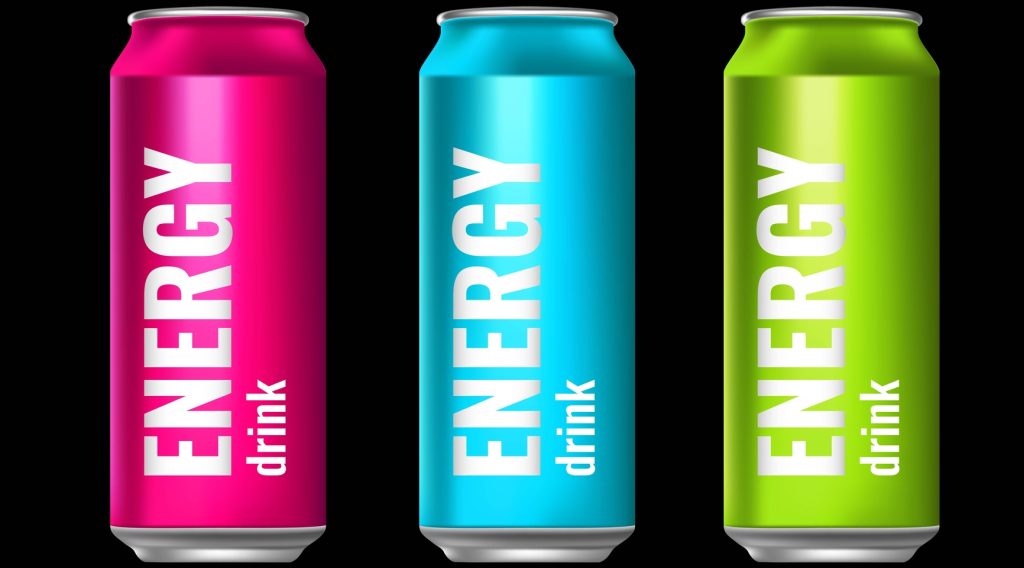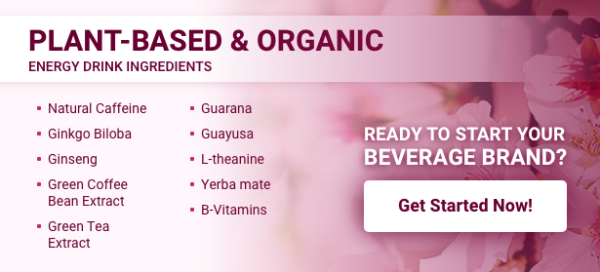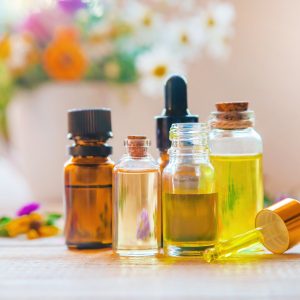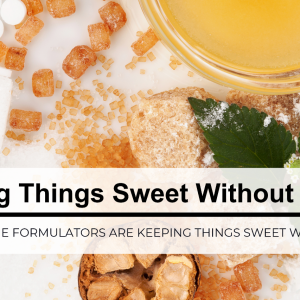The global energy drinks market reached $57 billion in 2020 and is expected to grow at a CAGR of 7% between 2022 and 2027. Energy drinks have become a beverage of choice for many people looking for an alternative to coffee. As opportunities within the category grow, beverage companies are looking for more ingredient options that will allow them to align their beverages with health-conscious consumers’ desires for cleaner, more natural, better-for-you ingredients.
Plant-Based and Organic Energy Drink Ingredients
According to Kerry’s 2021 “Botanical State of Mind” report, 44 percent of respondents identified energy support as a perceived benefit of consuming botanicals. Utilizing botanical ingredients to deliver energy allows beverage companies to leverage consumers’ perception of the healthy nature of plants to design attractive new products and formulations. Here are some promising plant-based ingredients creators are using to deliver the next generation of energy drinks to today’s health-conscious consumers.
Natural Caffeine Drinks
Natural Caffeine is extracted from coffee beans, cacao beans, Kola nuts, and the leaves and buds or bark of tea, Yerba mate, or Yoco. Other natural sources of caffeine include guarana berries, guayusa, and the yaupon holly. The major difference between natural and synthetic caffeine is that synthetic caffeine is produced from urea and chloroacetic acid, whereas natural caffeine is extracted from plant products for plant-based caffeine formulation.
Ginkgo Biloba
Ginkgo Biloba is a tree native to China that has been used for thousands of years. Most ginkgo products are made with extract prepared from its fan-shaped leaves. Ginkgo contains high levels of flavonoids and terpenoids – compounds known for their strong antioxidant effects. Ginkgo supplements are associated with several health claims and uses, most of which focus on brain function and blood circulation.
Ginseng in Energy Drinks
Ginseng is an extract made from the root of the ginseng plant. Panax ginseng, the most common form of ginseng used in energy drinks, comes from a plant that grows in Korea, China, and Siberia. Ginseng is an adaptogen believed to stimulate the body’s resistance to stressors. Panax ginseng contains many active chemicals, including ginsenosides or panaxosides, linked with improved performance in concentration, memory, and other mental functions.
Green Coffee Bean Extract
Green coffee bean extract comes from unroasted coffee beans. Green coffee beans contain caffeine but less than regular coffee. One cup of green coffee contains approximately 20 mg of caffeine, whereas one cup of regular coffee contains about 95 mg of caffeine. Green coffee beans also contain chlorogenic acid, which has antioxidant and anti-inflammatory properties.
Green Tea Extract
Green tea extract is a supplement derived from the green tea plant (Camellia Sinensis). Green tea extract contains concentrated compounds of antioxidants, polyphenols, vitamins, and flavonoids of green tea. The polyphenols of green tea are potent antioxidants linked to helping the body fight against heart disease, diabetes, weight gain, and cancer. The caffeine content of green tea extract varies between brands and can range from 25 milligrams to more than 200 milligrams of caffeine.
Guarana
Guarana is a South African fruit with seeds that contain more than twice as much caffeine as coffee beans. Containing up to 3.6%-5.8% caffeine by weight, Guarana also has theophylline and theobromine, which are similar to caffeine but have subtly different effects on the body. Molecules called tannins allow the caffeine in guarana to release slowly, producing a longer-lasting energy plateau. As a supplement, guarana is considered “generally recognized as safe” by the U.S. Food and Drug Administration.
Contact a Beverage Specialist Today
Guayusa
Guayusa is a tea made from the leaves of the guayusa tree found in the Amazon region of South America. A cousin to the yerba mate plant, guayusa is a botanical source of naturally occurring caffeine and antioxidants in the form of chlorogenic acids. Guayusa contains 20 percent more polyphenol antioxidants, double the caffeine, and 70 percent less bitter tannins than yerba maté and generally has more caffeine and a higher antioxidant profile than green tea.
L-theanine
L-theanine is a non-protein amino acid found primarily in green and black tea and some mushrooms. Some of the associated benefits of L-theanine include reducing anxiety, stress, and insomnia. L-theanine is thought to be a source of umami, the savory, brothy taste. In some products, L-theanine is used with caffeine to enhance cognitive skills. It is popular with energy drink makers as it alleviates many of the negative side effects of caffeine consumption. When combined with caffeine, it provides a sustained source of energy and heightened focus while also alleviating many of caffeine’s negative side effects such as anxiety, jitters and the “caffeine crash”.
Yerba mate
Yerba mate is an herb native to South America. It’s one of the few plants that naturally produce caffeine. At 85 mg of caffeine per cup, yerba mate contains less caffeine than coffee but more than a cup of tea. It also contains 24 essential vitamins, minerals, antioxidants, and 15 amino acids. It’s also rich in other beneficial compounds, including flavonoids, trace minerals, polyphenols, fatty acids, and chlorophyll. The dominant antioxidant in yerba mate is chlorogenic acid, the same antioxidant found in green coffee beans.
B-Vitamins
In addition to plant-based energy and focus-enhancing ingredients, many brands like Red Bull, Monster, and SoBe Lifewater are also incorporating vitamins, with B Vitamins topping the list. B Vitamins are a group of vitamins supporting a range of functions in your body. While B vitamins won’t give you a kick like caffeine, they are essential for your body to produce energy. Vitamin B-12, along with others in the B-vitamin complex, helps the metabolic functions in the body. The most popular B Vitamins added to energy drinks are Vitamin B3 (Niacin), Vitamin B6 (Pyridoxine), and Vitamin B12 (Cobalamin). Some energy drink brands also include Vitamin B2 (Riboflavin) and Vitamin B5 (Pantothenic Acid).
These are just a few of the ingredients energy drink makers use to meet consumers’ growing demands for healthier, better tasting, more convenient ways to fuel their bodies. As more research and broader acceptance drive further investment in natural energy ingredients, this list and the possibilities for beverage innovation will continue to grow.



